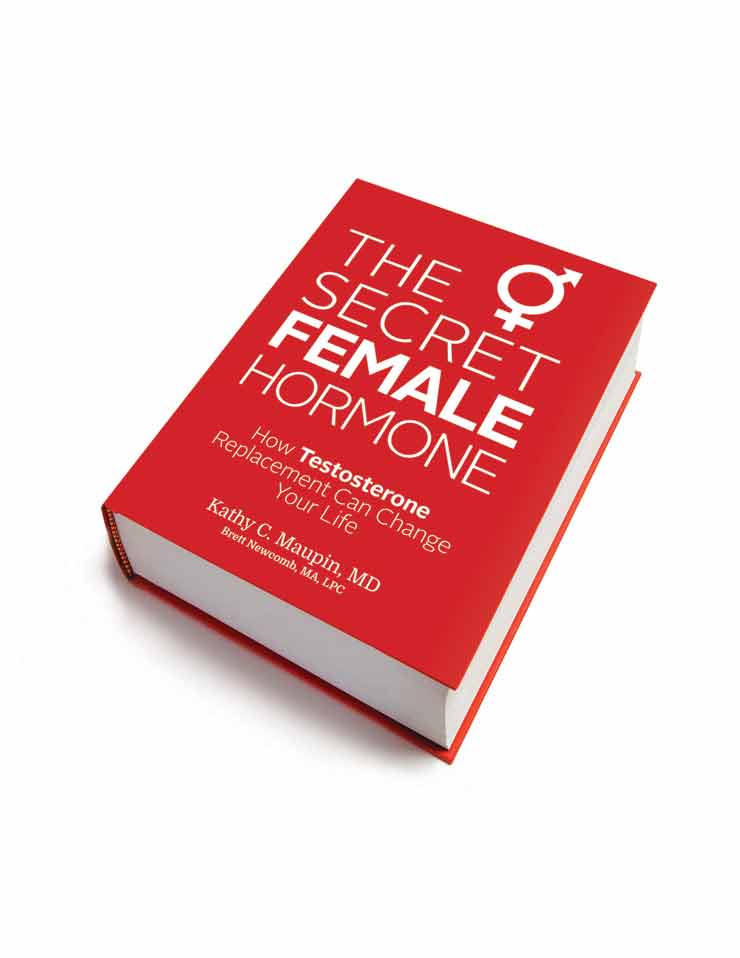When she was in her early 40s, Dr. Kathy Maupin entered what she calls “hormonal hell.” A board-certified ob-gyn for more than 25 years, she began taking supplemental progesterone and/or estrogen to soothe symptoms that included severe migraines, fatigue, mood swings, weight gain and complete loss of libido. “But traditional hormones just made it worse,” recalls Maupin, founder and medical director of BioBalance Health. A hysterectomy for endometriosis plunged her into full-on menopause. “I was so exhausted and distraught, I even considered giving up my medical practice,” she says.
Desperately seeking relief, Maupin went to one doctor after another, only to be told she was crazy, lazy, or that her symptoms were a normal result of aging and she should just get used to it. “But I finally found the answer in a hormone usually associated with men: testosterone,” she says. Her search, and the science behind it, can be found in The Secret Female Hormone: How Testosterone Replacement Can Change Your Life, a new book she co-authored with family therapist Brett Newcomb.
Estrogen, sometimes paired with progesterone, is often prescribed for women dealing with peri-menopause and menopause, Maupin notes. “But women make three times as much testosterone as estrogen up until age 40, when production starts dropping off,” she says. “Other hormones reduce production in response to that drop, triggering the premature aging process that’s usually attributed to a shortage of estrogen.”
Maupin and Newcomb, who have referred patients to each other for years, say this hormonal shift can affect every aspect of life. “Testosterone loss can cause depression, anxiety and lack of libido that used to be attributed to psychological or emotional difficulties or stress,” Newcomb says. “In 30 years of counseling, I’ve seen these issues erode intimacy on every level. Testosterone replacement can help people have the best quality of life as they age.”
But even though the hormone is touted by physicians and the pharmaceutical industry as the fountain of youth for aging males, the FDA has not approved a testosterone drug for women, Maupin notes. “Many ob-gyns don’t know how helpful testosterone can be, because most of the research has occurred in the field of endocrinology. That’s why it’s important to educate physicians in the use of bioidentical hormone replacement.”
Maupin’s individualized testosterone treatments, mixed with other hormones if needed, are formulated at a compounding pharmacy. Dosages are based on a blood panel to determine the patient’s hormonal status. Therapy is administered via an injected pellet that’s replaced every four to six months. “Unlike other delivery methods, pellets enter the bloodstream gradually, avoiding erratic absorption and hormonal fluctuations.” Maupin says. “We monitor patients carefully. Testosterone has few, if any, side effects, and benefits far outweigh risks.” She speaks from 11 years of personal experience. “Bioidentical testosterone has helped me and many of my patients, male and female, regain passion and vibrancy. It changed our lives for the better. It can change yours.”
Photo by Hay House Books
[Dr. Kathy Maupin and Brett Newcomb, authors of The Secret Female Hormone: How Testosterone Replacement Can Change Your Life. For more information, call 314.993.0963, or visit secretfemalehormone.com and biobalancehealth.com.]








